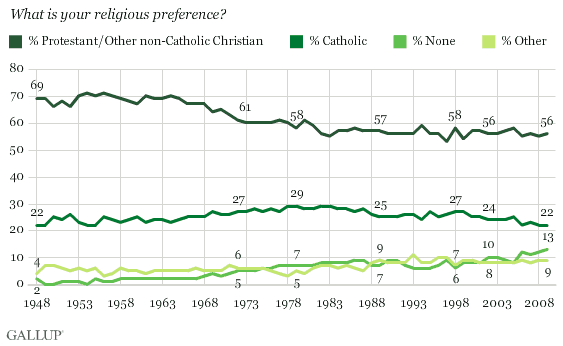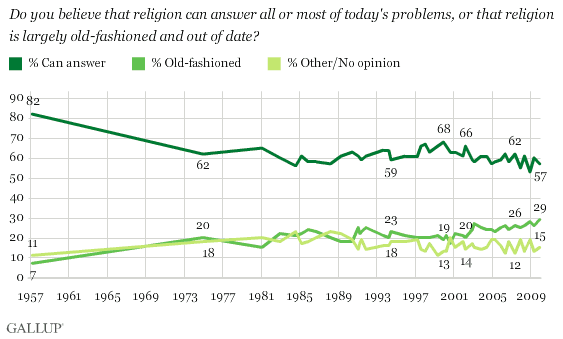As we ring in the new year, here’s some news to give you a sense of optimism for 2010. This holiday season, we can add another piece of evidence to the growing pile which indicates that atheists are becoming more numerous and more successful:

This Christmas season, 78% of Americans identify with some form of Christian religion, a proportion that has been declining in recent decades. The major reason for this decline has been an increase in the percentage of Americans claiming no religious identity, now at 13% of all adults.
Granted, 13% doesn’t seem like much, especially compared to the size of the Christian majority. But considering it was 2% in 1948, and only 6% even as recently as 1998, it can’t be denied that this represents a major demographic boom for atheists and nonbelievers of all stripes. I can’t think of any religion, historical or modern, that’s ever enjoyed such rapid success. And given the steadily increasing rates of secularism among the younger generations, we can expect this rise to continue.
What this shows, as I’ve said before and will doubtless continue to say, is that we should ignore the brow-furrowing and finger-wagging of the Very Serious theologians who sternly inform us that we’re doing a disservice to our own cause by advocating and defending it in public. We have every reason to believe that atheist campaigns of persuasion are working, achieving their intended purpose of convincing more people to become atheists and weakening the social prejudice that treats religious belief as immune to questioning.
Further evidence of this comes from the Gallup poll, which shows not only that more people are walking away from religion, but also that those who stay are beginning to question whether religious belief has all the answers:

Note that the percentage who say religion is “old-fashioned and out of date” now stands at 29%, significantly higher than the 13% of Americans who say they have no religion. We could call these people “soft atheists”. Most likely, the majority of these people aren’t formal members of any organized church, and either don’t attend religious services or attend only infrequently. But because of societal pressure to conform, or their own belief that belief in God is necessary for virtue or community, they continue to call themselves religious even as they reject most of religion’s factual claims.
These people are the low-hanging fruit whom atheists can reach. We need to deliver a strong, effective message that belief in God is not necessary for the things human beings care about – that nonbelievers can justify morality with reason and conscience, and build a secular community without reference to faith. And given that our audience’s sympathies are already leaning in that direction, we should continue to make the case that religious belief is archaic superstition, contains many immoral rules, and has no solutions for the ethical problems humanity faces today. Let the theologians and mystics continue to carp and complain that atheists are being disrespectful, that we’re not acknowledging the magnificence of the emperor’s new clothes. We don’t require their consent, and they’re not our target audience anyway. The continuing growth of atheism throughout the world is all the encouragement we need to speak out.
All images in this post via Gallup.